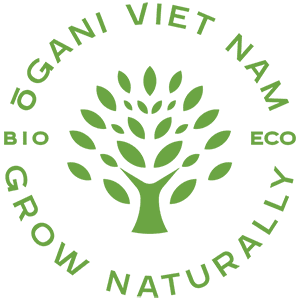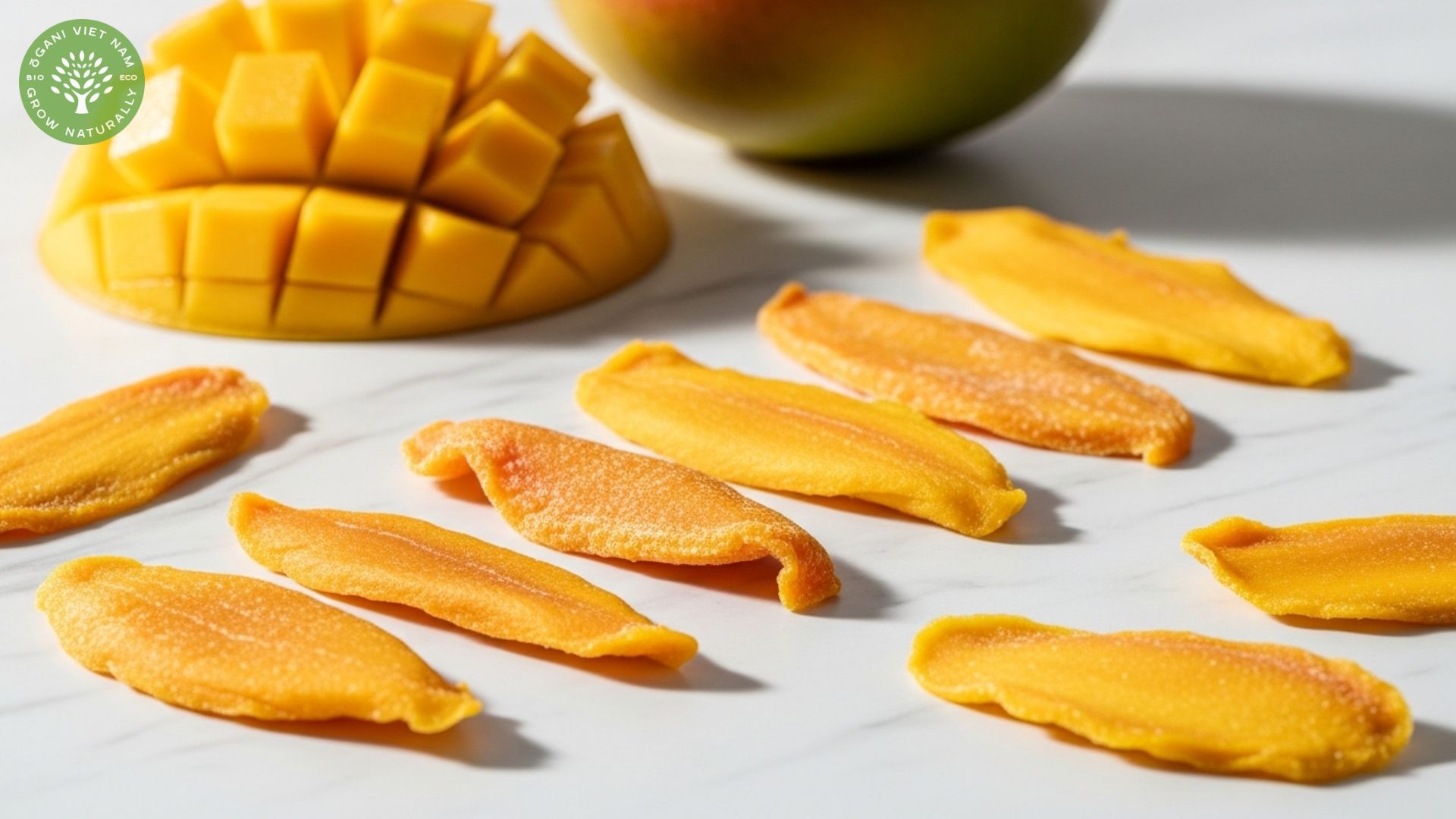When you’re searching for dried mango fiber content, you’re likely wondering about the exact nutritional value and health benefits of this popular dried fruit. At Ogani VN, we understand that fiber content is a crucial factor in making informed dietary choices. Dried mango typically contains 1-2 grams of dietary fiber per 30-gram serving, making it a moderate source of this essential nutrient.
Understanding dried mango’s nutritional profile
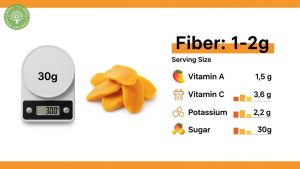
Dried mango fiber content varies depending on the processing method and brand, but most commercial varieties contain approximately 1-2 grams of dietary fiber per ounce (28-30 grams). This represents about 4-8% of your daily fiber needs in a single serving.
The fiber in dried mango consists primarily of insoluble fiber, which helps promote digestive health and regular bowel movements. Unlike fresh mango, which contains about 1.6 grams of fiber per 100 grams, dried mango concentrates these nutrients due to water removal during the dehydration process.
We at Ogani VN have observed that unsweetened, organic dried mango varieties typically retain higher fiber content compared to those with added sugars or preservatives. The concentration process not only intensifies the natural sweetness but also increases the fiber density per serving.
Health benefits of dietary fiber in dried mango
The dried mango fiber content contributes significantly to your overall health and wellness. Dietary fiber plays multiple roles in maintaining optimal bodily functions.
Digestive health support
The insoluble fiber found in dried mango acts as a natural digestive aid, helping to bulk up stool and promote regular bowel movements. This type of fiber doesn’t dissolve in water, instead moving through your digestive system relatively intact, sweeping waste and toxins along the way.
Regular consumption of fiber-rich foods like dried mango can help prevent constipation and maintain a healthy gut microbiome. The prebiotic properties of certain fibers also feed beneficial bacteria in your intestines, supporting overall digestive wellness.
Blood sugar regulation
Although dried mango contains natural sugars, its fiber content helps slow sugar absorption into the bloodstream. This gradual release prevents sudden spikes in blood glucose levels, making it a more balanced snack option when consumed in moderation.
The fiber creates a gel-like consistency in your stomach, which slows digestion and helps you feel fuller for longer periods. This satiety effect can be particularly beneficial for weight management and portion control.
Comparing dried mango fiber with other dried fruits
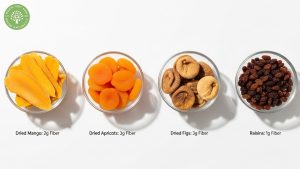
When evaluating dried mango fiber content against other popular dried fruits, it’s important to understand where it stands nutritionally. This comparison helps you make informed choices based on your specific dietary needs.
Dried apricots typically contain about 3 grams of fiber per ounce, making them higher in fiber than dried mango. Dried figs lead the pack with approximately 3.7 grams per ounce, while raisins contain roughly 1.4 grams per ounce, similar to dried mango.
Despite having moderate fiber content compared to some alternatives, dried mango offers unique nutritional benefits. It’s particularly rich in vitamin C, vitamin A, and antioxidants like beta-carotene. These compounds work synergistically with fiber to provide comprehensive health benefits.
At Ogani VN, we recommend considering not just fiber content but the overall nutritional profile when choosing dried fruits. Dried mango’s combination of fiber, vitamins, and minerals makes it a valuable addition to a balanced diet.
Maximizing the nutritional value of dried mango
To get the most from dried mango fiber content, proper selection and consumption practices are essential. The way you choose and eat dried mango can significantly impact its nutritional benefits.
Choosing quality dried mango
Look for unsweetened, organic dried mango varieties that don’t contain added sugars, sulfites, or artificial preservatives. These additives can diminish the natural nutritional value and may cause digestive issues in sensitive individuals.
Check the ingredient list carefully – the best dried mango products contain only one ingredient: mango. Avoid products with high fructose corn syrup, cane sugar, or artificial colors, as these additions provide empty calories without nutritional benefits.
Optimal consumption practices
Portion control is crucial when enjoying dried mango due to its concentrated nature. A typical serving size of 1 ounce (about 6-8 pieces) provides the fiber content mentioned while keeping calorie intake reasonable.
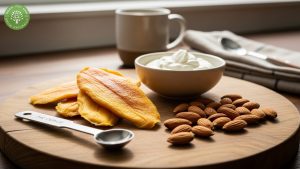
Pair dried mango with protein-rich foods like nuts or Greek yogurt to create a more balanced snack. This combination helps stabilize blood sugar levels and provides sustained energy throughout the day.
Frequently Asked Questions
How much fiber does dried mango contain compared to fresh mango? Dried mango contains approximately 1-2 grams of fiber per ounce, while fresh mango contains about 1.6 grams per 100 grams (3.5 ounces). The drying process concentrates nutrients, making dried mango more fiber-dense per serving.
Is the fiber in dried mango effective for digestive health? Yes, the insoluble fiber in dried mango supports digestive health by promoting regular bowel movements and feeding beneficial gut bacteria. However, consume it in moderation due to its concentrated sugar content.
Can I rely on dried mango as my primary fiber source? While dried mango contributes to your daily fiber intake, it shouldn’t be your only source. A varied diet including vegetables, whole grains, and legumes provides a better balance of soluble and insoluble fibers.
Does processing affect the fiber content in dried mango? The dehydration process typically preserves most of the fiber content while concentrating it. However, some commercial processing methods may slightly reduce overall nutritional value, which is why we recommend choosing minimally processed varieties.
Making the most of dried mango in your diet
Understanding dried mango fiber content helps you make informed nutritional choices that support your health goals. While dried mango provides moderate fiber content of 1-2 grams per ounce along with essential vitamins and antioxidants, it works best as part of a diverse, fiber-rich diet.
At Ogani VN, we’re committed to helping you access premium quality dried fruits that maximize nutritional benefits. Ready to incorporate healthy dried mango into your diet? Explore our selection of organic, unsweetened dried mango products and discover the perfect balance of taste and nutrition for your lifestyle. Contact us today to learn more about our premium dried fruit offerings and find the ideal products for your dietary needs.
Read more:
